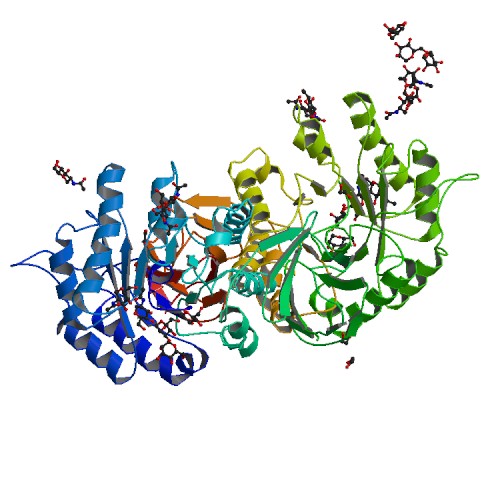Fabry disease
(Redirected from Fabry's disease)
Editor-In-Chief: Prab R Tumpati, MD
Obesity, Sleep & Internal medicine
Founder, WikiMD Wellnesspedia &
W8MD medical weight loss NYC and sleep center NYC
| Fabry disease | |
|---|---|

| |
| Synonyms | Anderson-Fabry disease, alpha-galactosidase A deficiency |
| Pronounce | |
| Specialty | Medical genetics |
| Symptoms | Pain, angiokeratoma, hypohidrosis, corneal opacity, tinnitus, hearing loss, kidney failure, heart disease |
| Complications | N/A |
| Onset | Childhood to adulthood |
| Duration | Lifelong |
| Types | N/A |
| Causes | Mutations in the GLA gene |
| Risks | Family history |
| Diagnosis | Genetic testing, enzyme assay |
| Differential diagnosis | Rheumatic fever, rheumatoid arthritis, multiple sclerosis |
| Prevention | N/A |
| Treatment | Enzyme replacement therapy, pain management, kidney transplantation |
| Medication | Agalsidase alfa, agalsidase beta, migalastat |
| Prognosis | Variable, depends on organ involvement and treatment |
| Frequency | 1 in 40,000 to 1 in 117,000 males |
| Deaths | |
Fabry Disease[edit | edit source]
Fabry disease is a rare genetic disorder that results from the buildup of a particular type of fat, called globotriaosylceramide, in the body's cells. It is an X-linked recessive disorder caused by mutations in the GLA gene, which leads to a deficiency of the enzyme alpha-galactosidase A.
Pathophysiology[edit | edit source]
Fabry disease is characterized by the accumulation of glycosphingolipids in the lysosomes of various cell types. The deficiency of alpha-galactosidase A enzyme activity results in the progressive deposition of globotriaosylceramide in the vascular endothelium, smooth muscle cells, and other tissues, leading to multi-systemic manifestations.
Clinical Manifestations[edit | edit source]
The symptoms of Fabry disease can vary widely among affected individuals, but common manifestations include:
- Angiokeratomas: Small, dark red spots on the skin, often found in the "bathing trunk" area.
- Acroparesthesia: Episodes of pain and burning sensations in the hands and feet.
- Corneal verticillata: Whorled patterns on the cornea, detectable by an eye examination.
- Renal impairment: Progressive kidney damage leading to chronic kidney disease.
- Cardiac involvement: Hypertrophic cardiomyopathy, arrhythmias, and heart failure.
- Cerebrovascular disease: Increased risk of stroke and transient ischemic attacks.
Diagnosis[edit | edit source]
Diagnosis of Fabry disease is typically confirmed through:
- Enzyme assay: Measurement of alpha-galactosidase A activity in blood or skin fibroblasts.
- Genetic testing: Identification of mutations in the GLA gene.
- Biopsy: Histological examination of affected tissues may show characteristic lipid deposits.
Treatment[edit | edit source]
The management of Fabry disease includes:
- Enzyme replacement therapy (ERT): Intravenous administration of recombinant alpha-galactosidase A to reduce globotriaosylceramide accumulation.
- Chaperone therapy: Use of pharmacological chaperones to stabilize the mutant enzyme and enhance its activity.
- Symptomatic treatment: Pain management, renal protection, and cardiovascular care.
- Gene therapy: An emerging approach aimed at correcting the underlying genetic defect.
Prognosis[edit | edit source]
The prognosis of Fabry disease varies depending on the severity of organ involvement and the effectiveness of treatment. Early diagnosis and initiation of therapy can improve outcomes and quality of life.
Epidemiology[edit | edit source]
Fabry disease is estimated to affect approximately 1 in 40,000 to 1 in 117,000 live births. It is more common in males due to its X-linked inheritance pattern, but females can also be affected, often with milder symptoms.
Images[edit | edit source]
See Also[edit | edit source]
Template:Lysosomal storage disorders
| Genetic disorders relating to deficiencies of transcription factor or coregulators | ||||||||||||||||||||||||||||||||||
|---|---|---|---|---|---|---|---|---|---|---|---|---|---|---|---|---|---|---|---|---|---|---|---|---|---|---|---|---|---|---|---|---|---|---|
|
Search WikiMD
Ad.Tired of being Overweight? Try W8MD's NYC physician weight loss.
Semaglutide (Ozempic / Wegovy and Tirzepatide (Mounjaro / Zepbound) available. Call 718 946 5500.
Advertise on WikiMD
|
WikiMD's Wellness Encyclopedia |
| Let Food Be Thy Medicine Medicine Thy Food - Hippocrates |
Translate this page: - East Asian
中文,
日本,
한국어,
South Asian
हिन्दी,
தமிழ்,
తెలుగు,
Urdu,
ಕನ್ನಡ,
Southeast Asian
Indonesian,
Vietnamese,
Thai,
မြန်မာဘာသာ,
বাংলা
European
español,
Deutsch,
français,
Greek,
português do Brasil,
polski,
română,
русский,
Nederlands,
norsk,
svenska,
suomi,
Italian
Middle Eastern & African
عربى,
Turkish,
Persian,
Hebrew,
Afrikaans,
isiZulu,
Kiswahili,
Other
Bulgarian,
Hungarian,
Czech,
Swedish,
മലയാളം,
मराठी,
ਪੰਜਾਬੀ,
ગુજરાતી,
Portuguese,
Ukrainian
Medical Disclaimer: WikiMD is not a substitute for professional medical advice. The information on WikiMD is provided as an information resource only, may be incorrect, outdated or misleading, and is not to be used or relied on for any diagnostic or treatment purposes. Please consult your health care provider before making any healthcare decisions or for guidance about a specific medical condition. WikiMD expressly disclaims responsibility, and shall have no liability, for any damages, loss, injury, or liability whatsoever suffered as a result of your reliance on the information contained in this site. By visiting this site you agree to the foregoing terms and conditions, which may from time to time be changed or supplemented by WikiMD. If you do not agree to the foregoing terms and conditions, you should not enter or use this site. See full disclaimer.
Credits:Most images are courtesy of Wikimedia commons, and templates, categories Wikipedia, licensed under CC BY SA or similar.
Contributors: Deepika vegiraju, Prab R. Tumpati, MD



